Raspberry is a very healthy and delicious snack for humans. They can serve as a dessert by themselves or mixed with other berries. Although raspberries are a perfectly safe food for humans, can rabbits eat raspberries?
Can Rabbits Eat Raspberries?
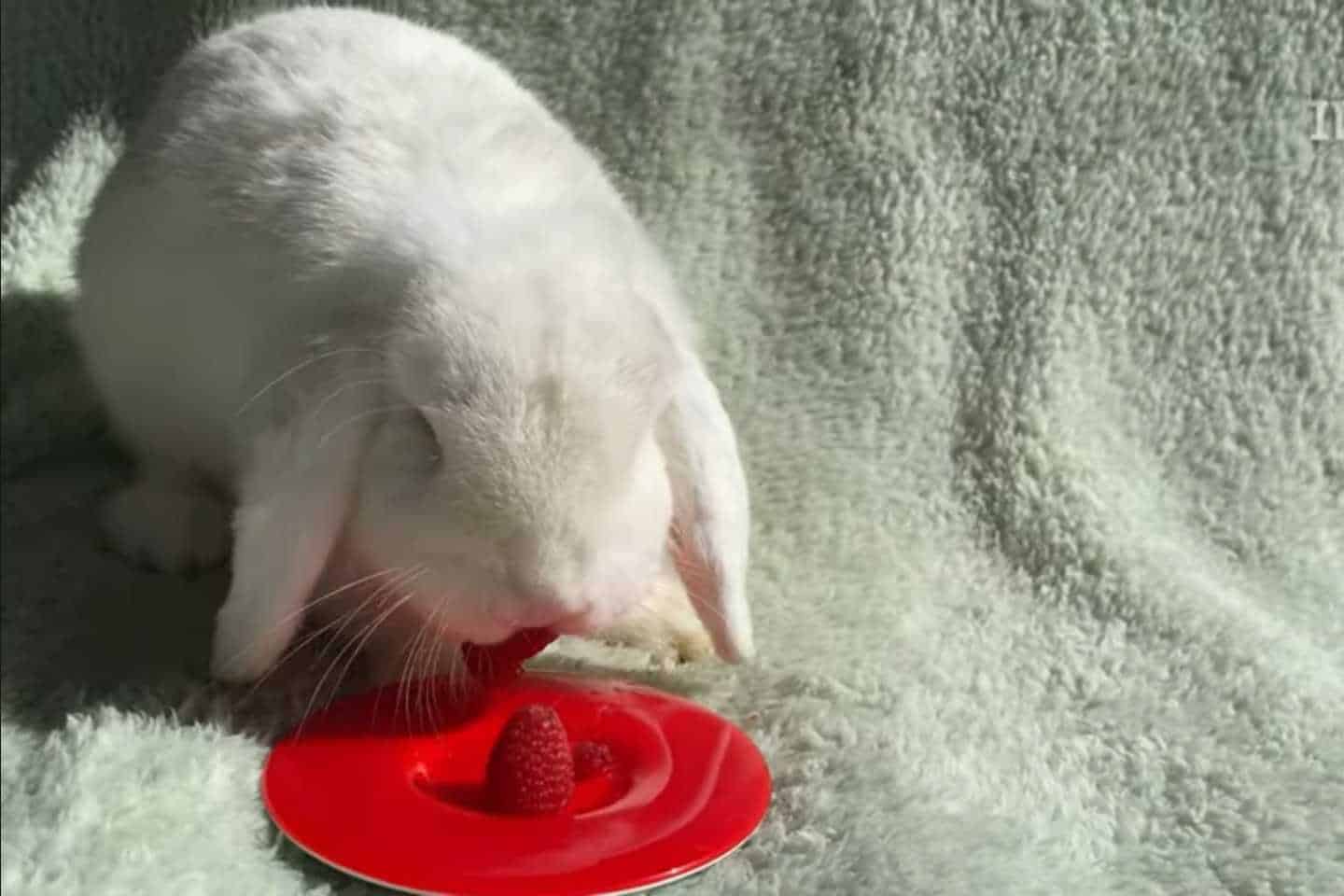
Yes, rabbits can safely eat raspberries. The fruit can provide many vitamins and minerals such as vitamin C, vitamin E, and choline. Despite the fruit being safe, unsupervised intake of raspberries can lead to health risks due to its high sugar content.
The diet of hay and grass must still be the primary food source for rabbits. Sweet fruits and vegetables such as raspberries and carrots should only be offered as a treat and not a substitute.
Can Baby Rabbits (Kits) Eat Raspberries?
Kits cannot eat raspberries. Rabbits under a year old should be given a pure diet of hay and grass. As the rabbits reach the age of maturity at around four to six months, they are given the supplementary diet of leafy green vegetables.
Can Wild Rabbits Eat Raspberries?
Wild rabbits are known to forage for many berries, including raspberries. Although they eat wild berries, it’s not the primary source of their diet.
Can Pregnant Rabbits Eat Raspberries?
Pregnant rabbits can safely eat raspberries. The fruit contains various minerals and antioxidants that may help the mother rabbit to have healthy kits. The leaves of raspberries also have medicinal properties that may help the rabbit in the delivery by strengthening their pelvic muscles.
Nutritional Value of Raspberries
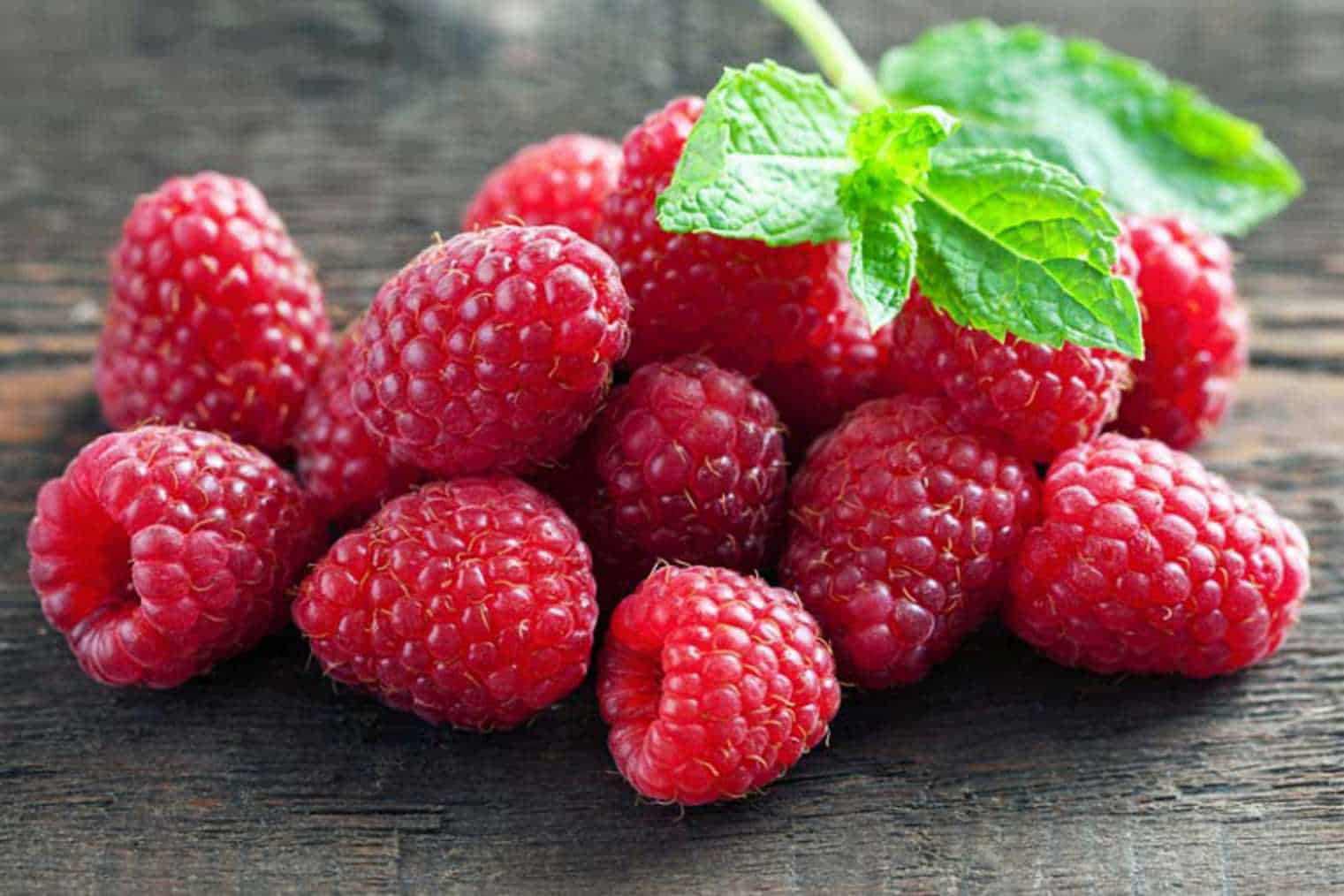
| Carbohydrates: 12.6g
Calcium: 25mg Fiber: 6.5g Protein: 1.2g Potassium: 151mg Magnesium: 22mg Vitamin E: 0.87mg Vitamin C: 26.2mg Vitamin B6: 0.1mg Choline: 12.3mg Iron: 0.7mg Fat: 0.6g |
Information provided by USDA for approximately one hundred grams serving of raspberry.
Potassium
Potassium acts as an electrolyte when it enters the body. It regulates the fluid balance along and maintains the healthiness of the nerves. The muscles and joints will also be healthier with the help of potassium.
Magnesium
The regulation of the enzymatic process in reducing blood sugar is one of the notable effects of magnesium. The mineral also helps with metabolism and better absorption of nutrition. Although most rabbits get considerable magnesium in their grazing diet, it doesn’t hurt to give them more.
Vitamin C
Vitamin C is the cornerstone for a better immune system. Since rabbits are susceptible to many diseases and viruses, a diet rich in vitamin C will tremendously help them fight the sickness off.
Choline
Choline is essential for faster and more efficient absorption of nutrients. It helps the fat move around the liver, resulting in a better conversion of nutrients to energy.
Calcium
Calcium strengthens the bones and teeth. As rabbits are known to be very active and playful, giving them the best bone health is essential for a joyful and active life. Calcium also aids the lifetime growth of the rabbit’s teeth leading to a much better diet.
Vitamin E
Vitamin E improves overall eye health. Besides various supplemental effects on the skin, the vitamin also helps maintain bones.
Vitamin B6
Pyridoxine, also known as vitamin B6, regulates the production of homocysteine in the blood resulting in a lesser risk of heart disease and infections.
What Parts of Raspberries Can a Rabbit Eat?
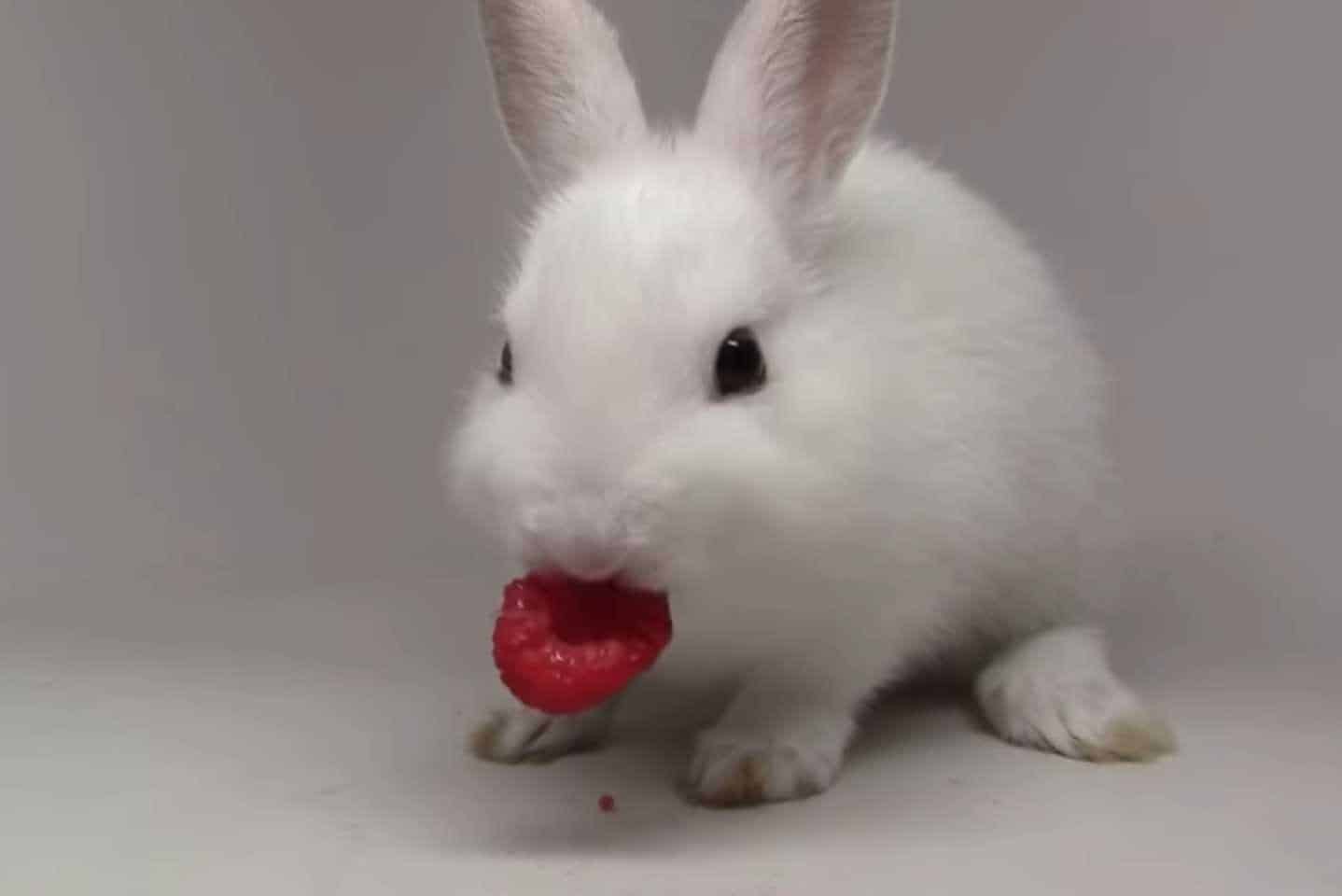
Other than the fruit, rabbits can eat the leaves and cane of the raspberry plant. Raspberry leaves are rich in nutrients such as fiber and have various medicinal properties.
Raspberry leaves can serve as a supplement for pregnant rabbits as it can ease the delivery of the kits by strengthening the pelvic muscles. Due to its anti-inflammatory properties, the leaves of the raspberry plant can also help treat uterine cancer.
The raspberry cane can also be eaten, but it’s not particularly tasty. The texture is also rough and chewy for the rabbits, so they might nibble on it but not eat and ingest it.
Dried and dried-freeze raspberries can be safely eaten by rabbits. However, a smaller amount per serving is recommended, especially for the dried ones, as it contains more sugar than fresh raspberries.
Can Raspberries be Dangerous to Rabbits?
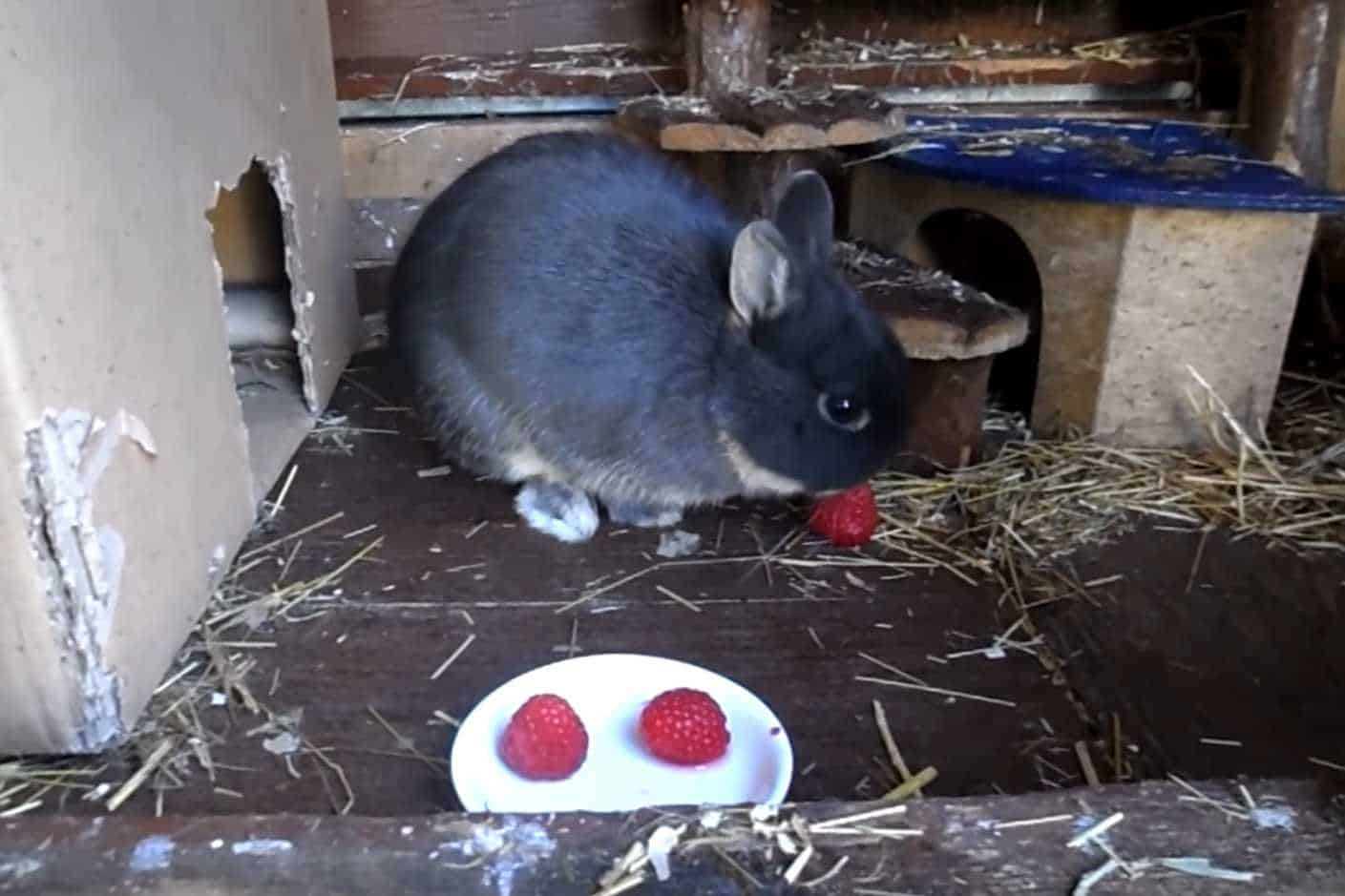
The answer is yes. Although raspberries are relatively safe for rabbits to eat, too much of the fruit can be dangerous. The health risks do not come from toxins or harmful chemicals, it come from sugar.
Raspberries, like any fruit, have a good number of sugars. Although sugar is a good energy source, too much of it can put the rabbit at many health risks.
One of the first symptoms is bloating and diarrhea. When feeding your rabbit with a serving above their limit, they can show signs of gastrointestinal irritation. Most of the rabbit’s diet consists of relatively less sugary foods such as hay and grass, so the large influx of sugar can shock the system.
Besides the fast signs of irritation, the large influx of sugar regularly can also cause long-term health problems such as diabetes and oral issues. The risk of gastrointestinal stasis also increases with sugar intake.
The best way to lessen the risk is to give the rabbits the proper amount per serving, which is the next part of this article.
Raspberries Feeding Tips

When feeding your rabbits with any produce, it’s best to wash it first. Even if the farmland where farmers do not implement the usage of pesticides, various insects and bacteria can still make their way into the surface of the fruit. This also applies to the supermarket-bought raspberries.
Although rabbits can safely consume raspberries, it’s better to proceed with caution. When introducing new fruits and vegetables to rabbits, it’s best to do it slowly. Rabbits are susceptible to bloating and diarrhea, so limit it to half or a whole small piece at their first taste of raspberries.
After twenty-four hours, watch out for signs of adverse effects such as diarrhea. If they show signs of gastrointestinal problems, it’s best to keep the raspberries away from them for a while. Let the symptoms subside and reintroduce the fruit again sparingly.
If nothing happens, you can give the bunnies around three to four pieces as a regular serving. You can serve raspberries around one to three times a week. Just make sure that you didn’t serve it with other sugary fruits.
Diabetic rabbits should be given around two tablespoons of raspberries per week. Ensure that they didn’t have any sugary fruits when serving them with raspberries.
In the end, hay and grass still make up eighty to ninety percent of the rabbit’s diet. Leafy greens and other fruits should always be supplementary and not their primary food source.
Benefits and Cons of Raspberries on Rabbits
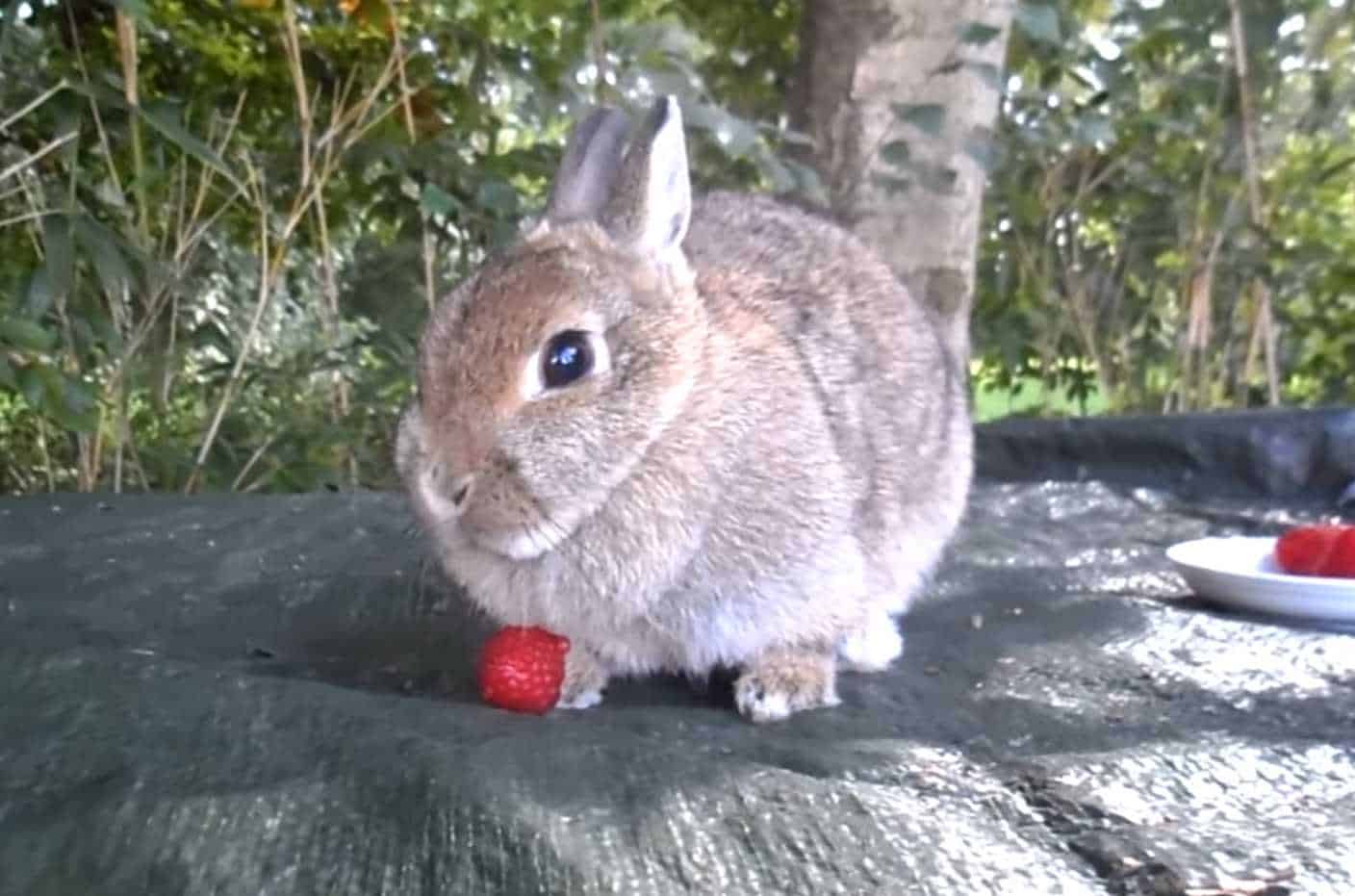
Raspberries have many benefits, with that also comes its downsides. Let’s get more in-depth as we explore the benefits and cons of raspberries.
| Benefits | Cons |
| · Various vitamins and minerals
· Antioxidants · The whole plant is edible |
· High Sugar Content
· Risks of Gastrointestinal Stasis · Messy to eat
|
Benefits of Raspberries on Rabbits
There are many vitamins and minerals found in raspberries. However, one of the most notable ones is vitamin C.
The fruit is very rich in vitamin C, a nutrient needed to fight various viral and infectious diseases. The vitamin also strengthens the immune system and makes the rabbit’s body more robust and less susceptible to infections.
Anthocyanin is the pigment that gives the raspberry its red color. It also serves as an antioxidant that can help fight off diabetes, inflammation, and heart problems. This particular chemical can also be found in various red and dark purple fruits such as pomegranate and blueberries.
Another benefit of raspberry is its plant. The whole raspberry plant, along with the canes, leaves, and fruits, can be safely consumed by rabbits. If you have a raspberry plant nearby, make sure to put countermeasures if you have a rabbit or a population of wild rabbits nearby.
Cons of Raspberries on Rabbits
Most of the cons of raspberry are rooted in its high sugar content. Although it’s easy to be solved by sticking to the recommended amount of serving, here are some health risks the rabbits can undergo with unsupervised raspberry consumption.
One of the most critical health risks is gastrointestinal stasis. This disease happens when the intestines do not have enough fiber to continue functioning. Although raspberries have fiber, it’s too small compared to the needed amount.
The other risk is the messy nature of raspberries. They are known to stain into the light-colored fur of the rabbits.
Other Fruits You Can Feed Your Rabbits
Watermelons have a high water substance and vitamin C. It’s a perfect summer treat for rabbits as it can keep them from dehydration.
There is no fruit with higher vitamin C than an orange. It can supply the ninety-two percent of the rabbit’s needed daily amount of vitamin C.
Another type of berries that is beneficial to rabbits. The fruit provides a good amount of vitamin A and K, perfect for good lungs and blood circulation.
In Conclusion
Yes, raspberries are perfectly safe for rabbits as long as they do not exceed the recommended serving size. We hope this guide minimized the and taught you how to feed rabbits with raspberries properly.